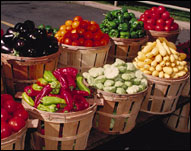Dear Umbra,
I love to freeze fresh veggies at their peak of ripeness during the summer. Then, in the winter, I don’t have to buy commercially frozen veggies or long-distance transported ones. In order to do more of this, I’d like to move my 1985 refrigerator to the basement and use its freezer entirely for this purpose. I would buy a new one designated Energy Star. Would this end up being environmentally a plus, a minus, or a wash?
Enid
Amherst, Mass.
Dearest Enid,

Veggie tales.
Photo: USDA.
Your 1985 refrigerator has passed its own peak of ripeness, as you may be aware. It’s approaching 20 years of hard work preserving your food. While it may still be effective, newer models have got it soundly beaten on the energy-expense and efficiency fronts. Home appliances as a whole have gained an enormous amount of efficiency over the past 30 years. When to let go of the old Frigidaire and shell out for a new one? The energy experts over at the American Council for an Energy-Efficient Economy (ACEEE to their friends) recommend replacement after about 15 years of service.
Your plan is all too common for the home food preservationist and family home manager, but it only makes sense from an initial cash outlay perspective. You plan to continue operating a largely empty and inefficient old icebox while adding a newer, efficient fridge to the mix. That is plainly an environmental minus, not to mention an economic minus. The average refrigerator accounts for anywhere from 15 to 25 percent of a home electric bill (depending on who you ask), so you’re looking to add a big chunk to your power bill on behalf of an appliance you barely use.
In an ideal world you would have the cash flow to dispose of the older icebox and buy an entirely new set of appliances to meet your food-storage needs. This would be ideal not only for the electric grid but for your pocketbook. Especially given your food-storage habits, a more efficient setup would pay for itself in electricity savings. When? It depends on your equipment and location, but it would be within years, not decades. Maybe a refrigerator-only unit could go in the kitchen and a chest freezer in the basement. You should be able to pick up a small Energy Star chest freezer for a couple hundred bucks. Or, find a refrigerator with a larger freezer — that might be all the space you need.
The Energy Star label makes shopping for an efficient cold food-storage box quite simple. If you’d like to dig further into low-power appliances, ACEEE ranks efficient appliances on their website and in their book Consumer Guide to Home Energy Savings.
Frigidly,
Umbra


